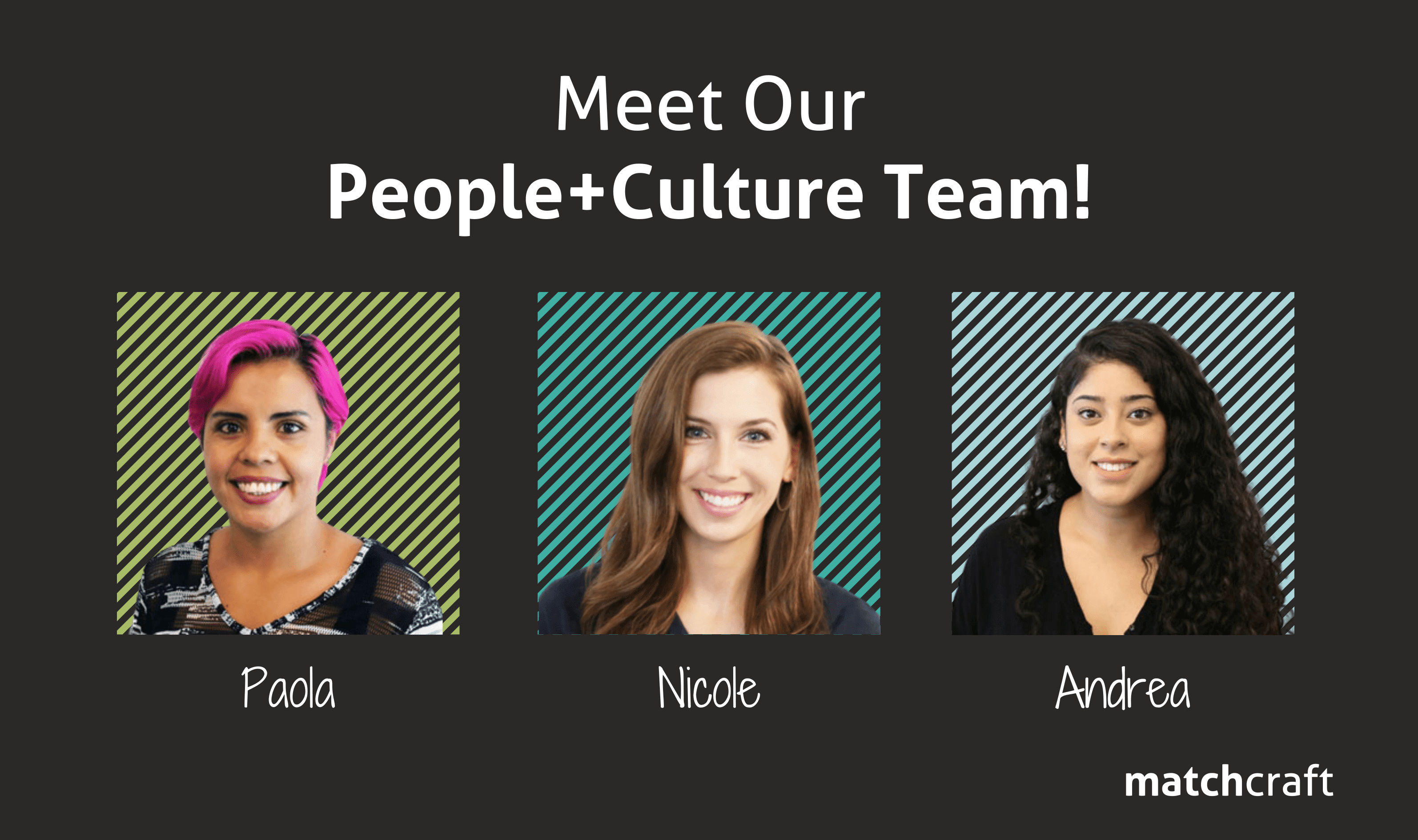We often talk about how the people at MatchCraft, and the company culture they have helped build, are some of MatchCraft’s biggest differentiators.
So it only seems apt to feature the team that drives our company’s employment and culture management processes – our People+Culture team!
What Does The People+Culture Team Do?
Our People+Culture (P+C) team is responsible for talent recruiting & on-boarding, employee experience & evaluations, payroll & benefits, and MatchCraft’s community service initiatives.
Since MatchCraft’s employee population is spread across the globe, a major responsibility shouldered by our P+C team is monitoring & managing compliance with local employment laws.
Getting To Know Them
- Andrea enjoys all things outdoors, from beach days & picnics with friends to bike rides with her family.
- The team’s travel expert, Nicole, has traveled 13 countries and has even hiked an active volcano. She also loves designing home interiors and jewelry.
- Paola who (self-professedly) is not musically gifted, can barely hear the differences between various genres and can’t play any instruments or sing, is absolutely convinced that every movie should be a musical. In the unlikely event that someone makes a movie about her life, she’ll demand it be a musical.
What They Love About Their Roles
- Versatility – Since the P+C team works on so many different aspects of employee management and engagement, there is a lot of room for their roles to be extremely versatile.
- Learning Opportunities – Being a part of the P+C team means getting access to new learning opportunities on a regular basis. There is always something new to explore because the way people behave, interact, and develop is very fluid and can’t be boxed in one-size-fits-all initiatives. So the team is constantly searching for & learning new ways to achieve their goals of keeping people informed, connected, & trained.
- Positive Impact – A big benefit of being in the P+C team is being able to implement initiatives that positively impact MatchCraft’s company culture and the entire employee population.
- Collaboration – The P+C team routinely collaborates with all the other teams at MatchCraft, sometimes doing work that may go beyond the traditional scope of human resources.
“Who doesn’t love to help people? There are tons of ways of doing that in this department,” said Paola.
Top Challenges
- Employee Engagement – The People+Culture team strives to create a culture that is engaging for all employees. Since MatchCraft’s team is remote, creating initiatives that help all employees feel connected and stay engaged can be a challenge.
- Global Compliance – The P+C team comes across completely unique situations all the time for which there are no playbooks. They have to make decisions quickly and in some instances be compliant with local guidelines based on the locations of our employees – an everyday challenge when working at a global company.
If Not In Human Resources Then What
- Paola would’ve explored her love of musicals by becoming a movie producer.
“Someone obviously needs to pay attention to those missed opportunities for musicals… producers don’t need to sing, right?” mused Paola.
- Nicole may have been a psychologist or a gemologist designing jewelry.
- Andrea would’ve enjoyed working in the non-profit sector as a field coordinator.
Why Human Resources?
Members of the team say that the breadth of the field coupled with the ability to help employees and companies succeed is what drew them to the human resources field. This profession offers the opportunity to take an innovative approach to talent management.
In their current roles, they like being able to contribute to MatchCraft’s culture by implementing ideas that represent the company’s DNA and the people who make the company what it is today.
Evolution of Human Resources
According to the team, human resources has developed and improved quite a bit over the past few decades.
In the past, human resource departments performed more process-centric functions such as regulatory compliance. Over time companies started paying more attention to the needs of their employees and the psychological motivators driving them. Thus, requiring human resource teams to take more of an employee-centric approach.
Today, the role of HR departments is more complex than ever, they still manage personnel and administrative tasks, but spend a lot more energy on promoting employee engagement and strengthening the company’s culture.
Their plans and efforts, while flexible and designed to be responsive to changing employee needs, are now integrated into the core strategies of the business.
“HR has transitioned from a seemingly antiquated and unapproachable role into a data driven, people and inclusion oriented field and it’s exciting to be a part of it,” said Nicole.
